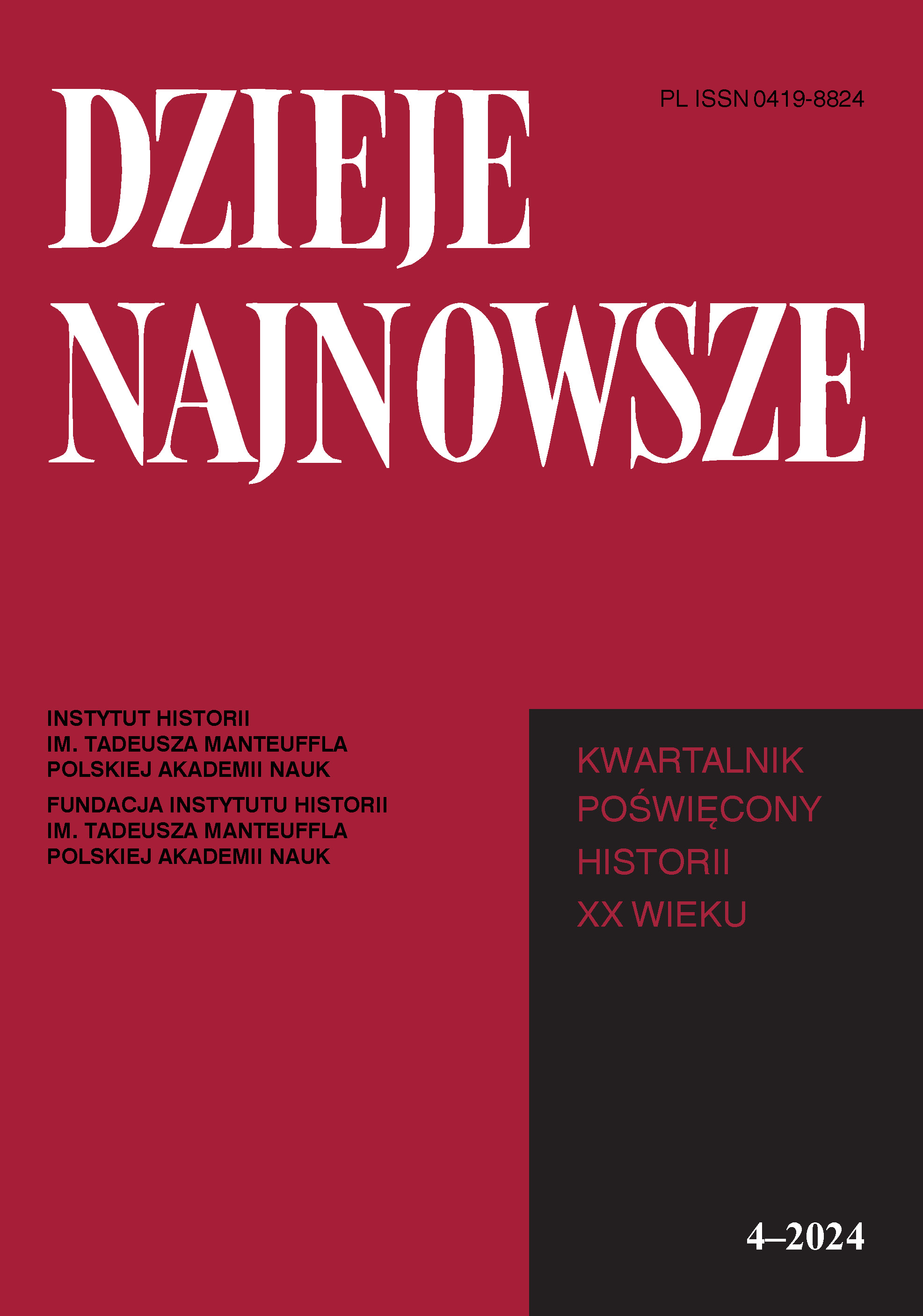Nigeryjscy pracownicy plantacji na Fernando Po w nigeryjskim dyskursie politycznym i stosunkach międzynarodowych w latach 1939–1968
DOI:
https://doi.org/10.12775/DN.2024.4.03Słowa kluczowe
Gwinea Hiszpańska, Nigeria, kakao, siła robocza, dekolonizacja Afryki, frankistowska hiszpańskaAbstrakt
Artykuł przedstawia kolejne etapy rozwoju gospodarki plantacyjnej w Gwinei Hiszpańskiej, zwłaszcza na wyspie Fernando Po, oraz sposoby sprowadzania siły roboczej zdolnej do pracy na plantacjach kakao. Tłumaczy przyczyny imigracji Nigeryjczyków do Gwinei Hiszpańskiej, zwłaszcza od lat 30. XX w. Tekst przedstawia wpływ cudzoziemskich robotników na oficjalne relacje między rządami w Madrycie i Lagos.
Bibliografia
Archival Sources
Archivo General de la Administración, Madrid, España: Caja 81.
Published Sources
The United Nations Demographic Yearbook (1968).
Press
Daily Express
Sunday Times
West African Pilot
Secondary Literature
Adu Boahen A., General History of Africa. VII. Africa under Colonial Domination 1880–1935 (Paris, 2000).
Akinyemi B., ‘Nigeria and Fernando Poo, 1958–1966. The Politics of Irredentism’, African Affairs, no. 69 (1970), pp. 236–49.
Clarence-Smith G., ‘The Hidden Costs of Labour on the Cocoa Plantations of São Tomé and Príncipe, 1875–1914’, Portuguese Studies, vol. 6 (1990), pp. 152–72.
Clarence-Smith G., ‘The Impact of the Spanish Civil War and the Second World War on Portuguese and Spanish Africa’, Journal of African History, vol. 26, no. 4 (1985), pp. 309–26.
Ejituwu N.C., ‘Anglo-Spanish Employment Agency: Its Role in the Mobilization of Nigerian Labour for the Island of Fernando Po’, in The Nigeria-Equatorial Guinea Transborder Cooperation, ed. by A.I. Asiwaju, B.M. Barkindo, R.E. Mabale (Lagos, 1995).
Falola T., Genova A., Historical Dictionary of Nigeria (Plymouth, 2009).
Kruze P., ‘Koncepcje ustroju politycznego w kolonialnej Gwinei Hiszpańskiej i w niepodległej Gwinei Równikowej’, Afryka, no. 47 (2018), pp. 51–70.
Leśniewski M., ‘Biafra 1966–1970’, in Konflikty kolonialne i postkolonialne w Afryce i Azji 1869–2006, ed. by P. Ostaszewski (Warszawa, 2007), pp. 446–55.
Liniger-Goumaz M., Historical Dictionary of Equatorial Guinea (London, 2000).
Martino E., ‘Clandestine Recruitment Networks in the Bight of Biafra Fernando Po Answer to the Labour Question 1926–1945’, International Review of Social History, vol. 57 (2012), pp. 39–72.
Martino E., ‘Touts and Despots: Recruiting Assemblages of Contract Labour in Fernando Pó and the Gulf of Guinea, 1858–1979’, PhD dissertation (Humboldt-Universität zu Berlin, Berlin, 2017).
Mba Ncony D., La independencia de Guinea Ecuatorial: cuestión prepolítica (Madrid, 2018).
Morrill W. T., ‘Two Urban Cultures of Calabar, Nigeria’, PhD dissertation (University of Chicago, Chicago, 1961).
Muojama O.G., ‘The Nigerian Cocoa Farmers and the Fluctuations in World Cocoa Prices in the 1930s’, International Journal of Arts and Humanities, vol. 5, no. 19 (2016), pp. 214–31.
Ndongo Bidyogo D., Historia y tragedia de Guinea Ecuatorial (Madrid, 1977).
Nugent P., Africa since independence (New York, 2004).
Oham A.C., ‘Labor Migration from Southeastern Nigeria to Spanish Fernando Po, 1900–1968’, MA thesis (Central Michigan University, 2006).
Okenve Martinez E.S., ‘Equatorial Guinea 1927–1979: A new African tradition’, PhD dissertation (University of London, London, 2018).
Olufemi Ekundare R., An Economic History of Nigeria 1860–1960 (London, 1973).
Osoba S.O., ‘The Phenomenon of Labour Migration in the Era of British Colonial Rule: A Neglected Aspect of Nigeria’s Social History’, Journal of the Historical Society of Nigeria, vol. 4, no. 4 (1969), pp. 517–18.
Osuntokun A., Equatorial Guinea-Nigerian Relations (Ibadan, 1978).
Sundiata I.K., ‘Prelude to Scandal: Liberia and Fernando Po 1880–1930’, Journal of African History, vol. 15, no. 1 (1974), pp. 97–112.
Internet Site
Pobrania
Opublikowane
Jak cytować
Numer
Dział
Licencja

Utwór dostępny jest na licencji Creative Commons Uznanie autorstwa – Bez utworów zależnych 4.0 Międzynarodowe.
Statystyki
Liczba wyświetleń i pobrań: 351
Liczba cytowań: 0



